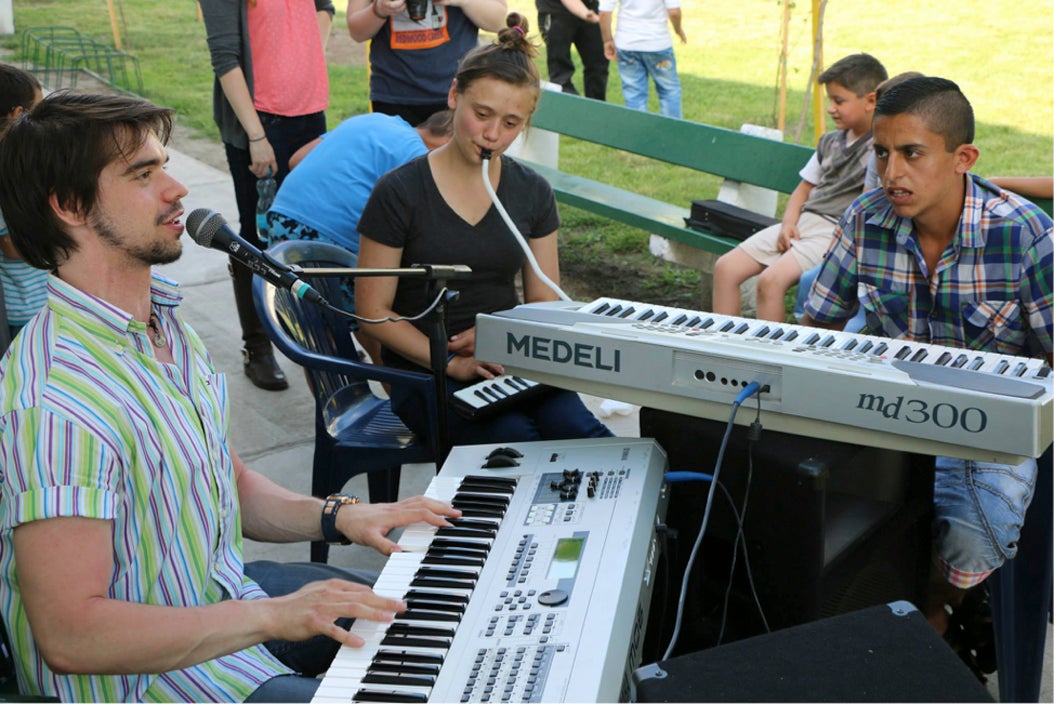
Subscribe to Pittwire Today
Get the most interesting and important stories from the University of Pittsburgh.Pitt Musicians Take Talents Abroad
As the cauldrons of traditional Roma goulash boiled at a picnic in a southeast Hungarian village, local keyboard players improvised new melodies.
In that town, called Vegegyhaza, Pitt senior Kelly Glavin got a chance to share her melodica — a wind instrument played with piano keys — with Czech musicians.
“The boys at the picnic loved playing keyboard and played throughout the picnic,” Glavin, a member of Pitt’s Carpathian ensemble, said. “I eventually jammed with them. Everyone there was fascinated by the melodica and tried it out.”
Glavin, a double major in neuroscience and psychology, traveled to Hungary and the Czech Republic in 2014 as part of the Romani culture study abroad program. Through the two week program, students participate in community cultural tours, activities and music events in Hungary and the Czech Republic. Glavin learned about the cultural and political life of European music and was exposed to a variety of new meters and rhythms — song composition in these genres is astronomically different from those of Western music.
The Pitt music department runs multiple study abroad programs for students in on-campus musical ensembles, groups or clubs looking to experience performance in other countries. These programs give members of Pitt ensembles including the Carpathian ensemble, the Heinz Chapel Choir and the Women’s Choral Ensemble the opportunity to practice their craft in unfamiliar regions.
Tour costs vary, depending on where the group travels and for how long — but, at least for Heinz Chapel Choir members, international tours cost about $3,800, and each member receives $2,000 from the Heinz Foundation. After fundraising enough money to cut $200 off of the member costs, Women’s Choral Ensemble members paid $220 to go to Canada in summer 2016.
The Carpathian ensemble, directed by Jonathan Heins and Adriana Helbig, focuses on Roma, Klezmer and Armenian music and other eastern European styles.
In their most recent voyage beyond Pittsburgh’s boundaries — a two-week trip in June 2014 — students attended the World Roma Festival, Khamoro, in Prague, explored Budapest and hosted the “jam session” in Vegegyhaza. Glavin said the program taught about the history of Roma persecution and political unrest.
“The Roma have been persecuted in Europe ever since they arrived there. But they have been revered for their musical talents for just as long … and they use that to help them in their fight for justice,” Glavin said.
Rachel Martin, the current president of the ensemble, originally joined the group to fulfill an extra world music credit but stuck around when Professor Helbig told her the trumpet would meld well with the other represented instruments: the flutes, clarinets and accordions, for instance. Martin, a senior applied developmental psychology major and music minor, said before she joined the group, she knew virtually nothing about Eastern and central European music.
“We’re so overwhelmed with Western music that we don’t really get a chance to hear other types of music, let alone folk music,” she said.
After being exposed to new genres, Martin also discovered a lot about cultural isolation and international relations. In the past, when the U.S. has had conflicts with Turkey, the ensemble has had to refrain from playing Turkish pieces. According to Martin, it’s a question of respect and navigating what’s appropriate at the time.
“Watching the politics of the world change kind of influences what types of songs and music we play,” Martin said.
The Women’s Choral Ensemble, directed by Lorraine Milovac, is known for its repertoire of traditional and sacred classical songs, folk music, popular music and showtunes. Its members have also had their fair share of travel opportunities.
In a 2016 excursion to Ontario, Canada, the group watched The Famous People Players puppet troupe, took The Graffiti Tour, attended a worship service and performed at several Canadian high schools.
The ensemble had been fundraising for its 2016 tour since senior Lexi Bovalino’s first year at Pitt. Performing in Canada allowed the group to finally see its hard work come to fruition.
Over the course of their travels, Bovalino, a marketing and human resources management major, and the ensemble spent time in the Second City comedy club in Toronto, which offered Bovalino insight about Canadian humor and perspective.
“At first, I wondered what educational element a comedy club could provide — but I soon realized that you can tell a lot about a culture from the jokes they tell,” Bovalino said.
The groups also take trips inside the states. Dr. Susan Rice, a longtime lecturer for the music department and the tenth conductor and director of the Heinz Chapel Choir, has been organizing performance tours — both domestic and abroad — for the past couple of years.
In the past, the previous director, John Goldsmith, led the choir’s tours throughout the Balkans, Peru, Bolivia, China and Hong Kong — Goldsmith passed away last week and his memorial service will be Feb. 24 at 11 a.m. in Heinz Chapel.
The group visited Brazil in 2016 and will continue to go abroad for more performance opportunities and exploration in the years ahead. The next planned trip is a tour through England and Scotland this May.
Expect Pitt’s musical groups to continue taking on the world. Despite political, military or cultural clashes between countries, music is a shared language, Galvin said.
“I think music is the best way to be exposed to a culture,” she said. “So many aspects of a culture are hard to grasp due to language barriers. But music is universal.”


